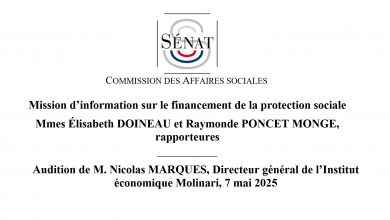Social protection financing reform in France: the relentless pursuit
Article published exclusively on the Institut économique Molinari’s website.
The French President intends to engage in a reform of social protection financing. Jacques Chirac, expressing his wishes for the New Year, affirmed that it was advisable to base its financing on the added value of companies rather than on work.
The French President intends to engage in a reform of social protection financing. Jacques Chirac, expressing his wishes for the New Year, affirmed that it was advisable to base its financing on the added value of companies rather than on work. In addition to battling against unemployment thanks to the lowering of employers’ contributions on wages, the widening of the base of deductions to all added value incomes would guarantee « a high level of social protection. » It is allowed to doubt that such a reform could secure the « French social model. » At best, the difficulties will be pushed back and will reappear in the long term in an even more alarming way. It is the political choice of the relentless pursuit.
Since Mr. Chirac wants to be close to the rural community, we will use a somewhat pastoral analogy to understand the nature of the system and the implied mistake in the Head of State’s proposal. Since a famous article by the biologist Garett Hardin, the explanation of the overexploitation and the exhaustion of certain natural resources is called « the tragedy of the commons. » This analysis, traditional in environmental economics, also applies to social protection and its programmed explosion.
Let us go back in time and imagine a meadow whose access is open, near a medieval village. The inhabitants take their cows out to pasture there. No problem arises as the resource is more abundant than the need. On the other hand, as soon as the population of men and their animals increases, Hardin tells us, problems appear. If the meadow remains a good at the disposal of all, if it « belongs to everyone, » it will be overexploited until its capacity to nourish cows is exhausted.
How does one get there? Each farmer draws an income from his activity, for example from the sale of milk. By adding cows to their livestock, they can increase their income. At the same time, the addition of an animal decreases the soil’s output, to the detriment of the quantity of milk produced. Each farmer may well be aware of this without having much interest in refraining from their exploitation and maintaining the pasture. Indeed, the consequences of the soil erosion are born by all the farmers. The addition of an animal thus has a very weak negative impact for its owner, an impact largely counterbalanced by the additional milk sale which they will thus be able to attain.
Free access to meadow means that each farmer can count on others to bear the costs of his choices whereas he alone pockets the proceeds. The meadow becomes over-populated with cows. Moreover, no farmer has any interest in maintaining it since they alone must bear an investment which all the others will be able to benefit from to their detriment. The outcome is not in doubt: it is the ruin of all.
What relationship is there between this « tragedy » and the financing of social protection? In fact, the two situations are similar. Social protection system actors are encouraged to behave like the inhabitants of the village. Because of the « collective ownership » of pasture land, each farmer can have the consequences of their choices supported by others. Because of the collectivisation of social protection financing, each participant is invited to benefit from the system without regard to the costs associated with their choices, as they can count on others to foot the bill. The bill increases and nobody has an interest in maintaining the common pool while working more, since the benefit of such an investment will be dispersed among society.
We thus take issue with a gigantic « tragedy of the commons. » The common pasture is the fund formed by the pooling of producers incomes, fed by contributions and taxes. People are invited to spend them until the funds are exhausted. Rather than to try to leave such a vicious circle, Mr Chirac’s proposal amounts to extending depredations to new pastures, by increasing the base of deductions. But the process must continue as long as the incentives are the same ones. Collapse is temporarily pushed back. It will be however even more brutal because the destroyed production will be more important. Vis-à-vis such a prospect, it is increasingly urgent to envisage alternative solutions based on personal liability.
Xavier Méra is an associated researcher at the Molinari Economic Institute.





